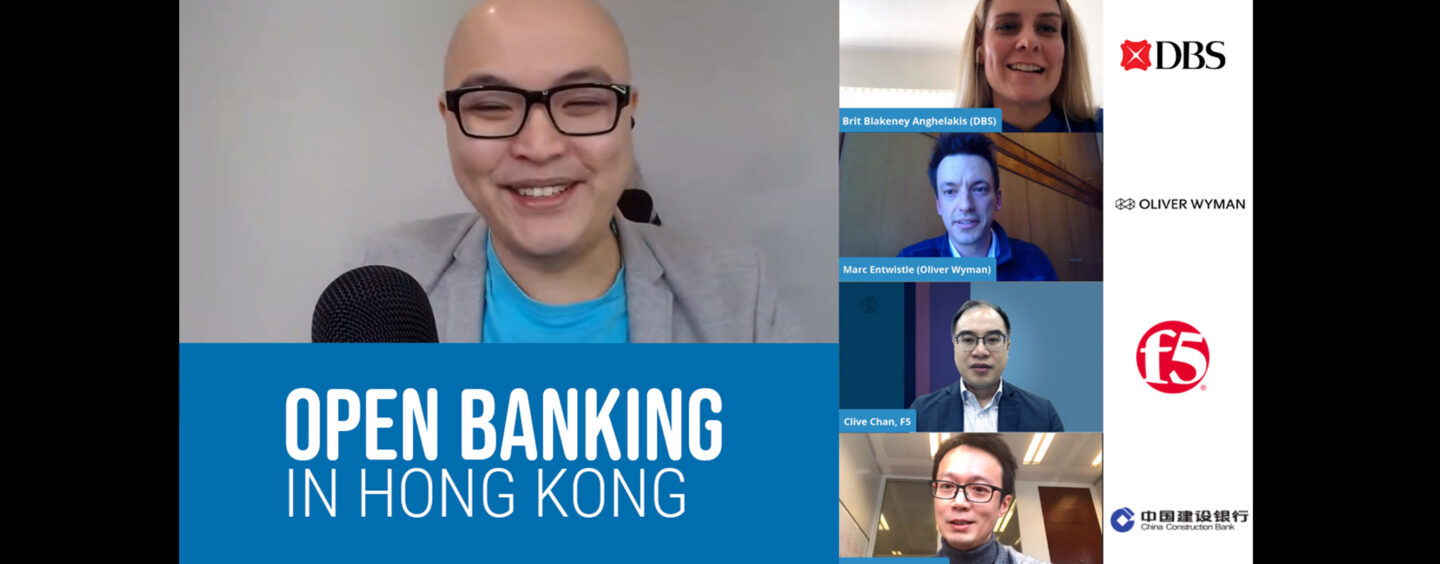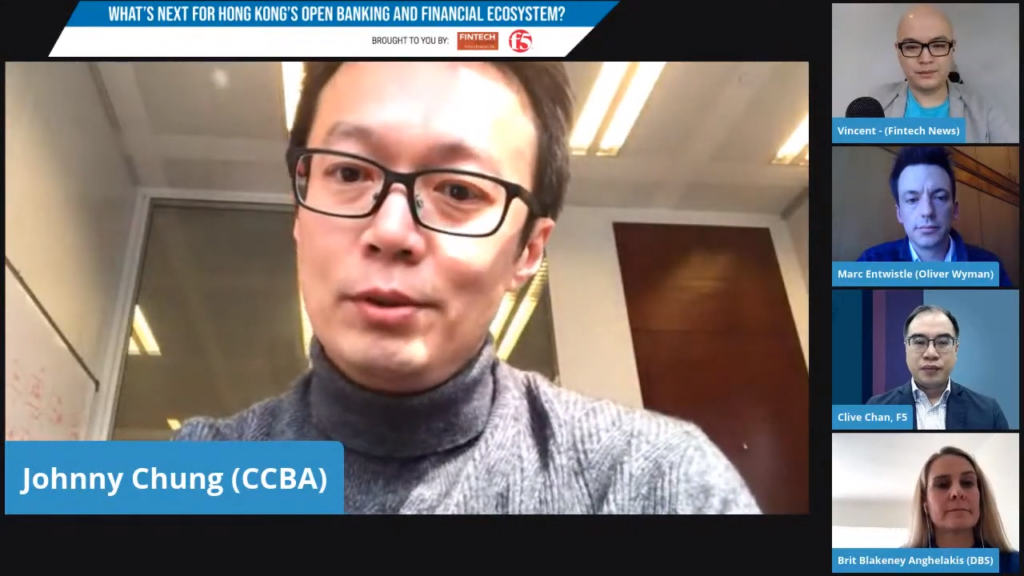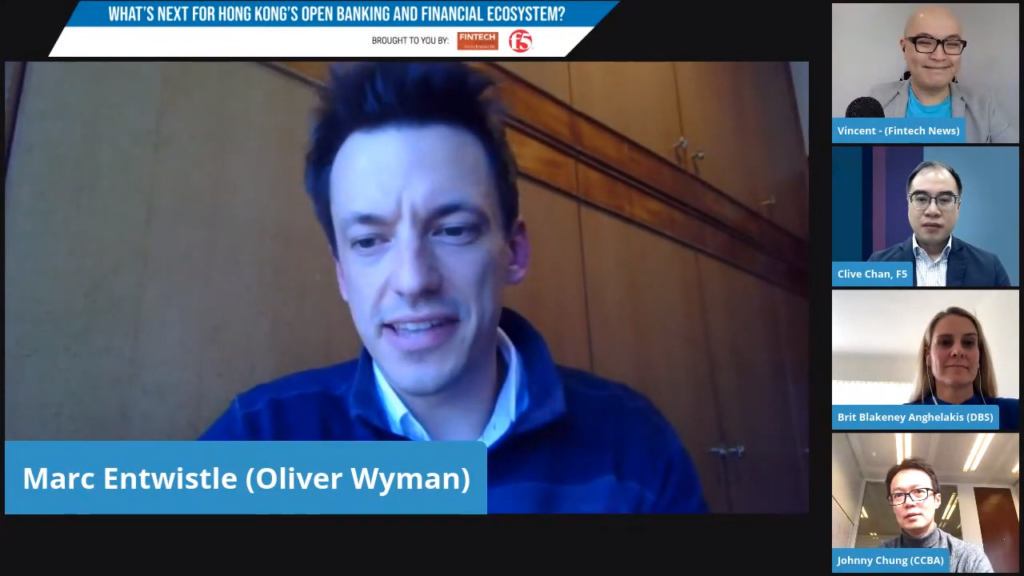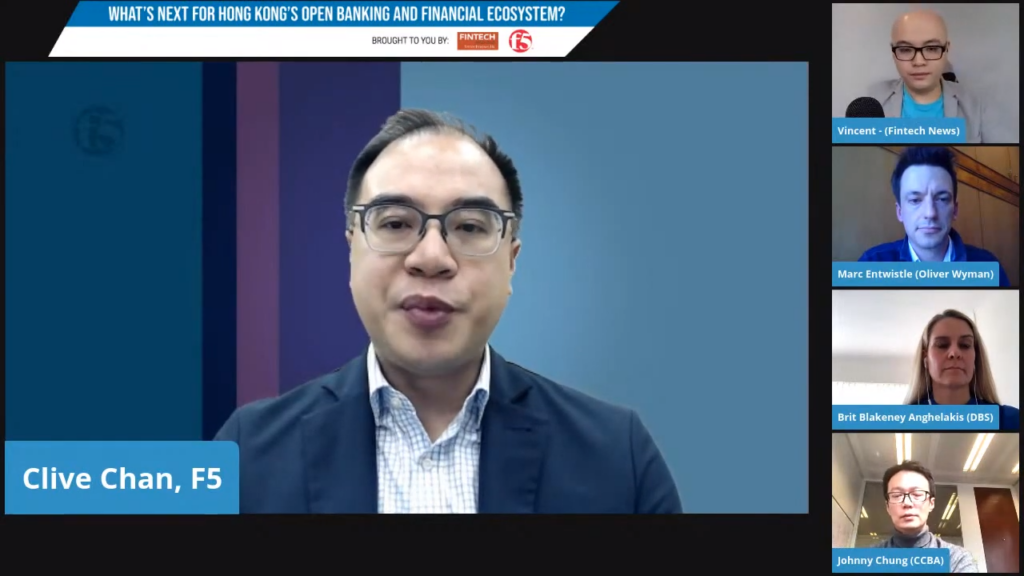
Hong Kong’s Next Phases of Open Banking Presents Exciting Opportunities
by Fintech News Hong Kong February 16, 2021Two years into the implementation of open banking and Hong Kong is now heading into Phase III and Phase IV of its strategy, which will see account information and customers’ transactions being made available to third-party providers.
As the region moves deeper into open banking, government-led initiatives such as the Commercial Data Interchange (CDI) and the iAM Smart will bring new and exciting opportunities for the banking and financial services sector to tap into, experts said during a virtual panel discussion.
Citing research his firm conducted in partnership with Twimbit, Clive Chan, manager of solutions engineering for Hong Kong and Macau at F5, said Hong Kong was one of the world’s champions in open banking, alongside Singapore and the UK. These jurisdictions have demonstrated leadership and maturity in implementing progressive policies as well as promoting innovation and competition in terms of technology, business models and financial services, he said.
Johnny Chung, general manager and division head for fintech and product innovation at China Construction Bank (Asia) (CCB Asia), said that they do not view the open banking initiative project as a compliance exercise, but instead it has enabled the bank to accelerate innovation and collaborate with other industry players. He cited for example the recent launch of the co-branded Octopus Auto Living UnionPay Diamond Credit Card.

Johnny Chung, general manager and division head for fintech and product innovation at China Construction Bank (Asia) (CCB Asia)
Moving forward, Chung said CCB Asia “will be focusing on how to transform user experience and offer new services on different channels.”
The Hong Kong Monetary Authority (HKMA) launched the Open API framework in July 2018, laying out a four phased strategy in embracing open banking. The first two phases, both launched in 2019, focused on providing access to data that had already been available in some way. These first two phases were more about readying the financial services industry and leveling the field.

Marc Entwistle, Principal at Oliver Wyman Digital
“[Hong Kong] has done well in terms of getting some of the basic infrastructure in place,” Marc Entwistle, principal at Oliver Wyman Digital, said during the panel discussion. “Now there’s a big step toward actually providing that as a quality service that third-party would be able to use and would want to use and build products and services around. And at the same time, make [open banking] attractive for the banks themselves.”
To make open banking more appealing to banks and ensure some sort of return on investment, Hong Kong is developing the CDI, a consent-based financial infrastructure for commercial data.
“One of the key problems seen in all markets [with open banking and open APIs] is ‘how do banks monetize this and how do we justify this investment?’ CDI [would allow] to get data of small and medium-sized enterprises (SMEs) and share that back to the banks,” Entwistle explained. “In this case, it’s actually the banks that are benefiting from receiving the data. And it’s additional data that translate much more easily into a business use case.”
The first business use cases that come to mind would be credit scoring and loans, where data collected from the CDI would allow banks to have a much clearer understanding of SMEs’ risk profile and better service them. But these capabilities could be easily extended to other applications and create new opportunities beyond banking, ultimately taking Hong Kong’s open API strategy closer to what’s been done in Australia with the so-called open data economy.
“There’s no reason why that couldn’t be extended to other use cases such as digital IDs, which is now a hot topic in Hong Kong with the iAM Smart platform rolling out. IAM Smart is bringing access to electronic ID, which converges with other programs and could potentially lead to providing unique ID authentication in the larger Greater Bay Area,” he said.
Echoing Entwistle, Brit Blakeney Anghelakis, executive director of innovation and ecosystems for DBS Bank’s consumer banking, said with Phase III and Phase IV, the focus will shift towards SMEs, an exciting development for DBS Bank considering that it just recently launched a fully digital bank for SMEs.

Brit Blakeney Anghelakis, Executive Director of Innovation and Ecosystems for DBS
“We will be developing on this, and with the CDI, it’s really going to help us better serve our SME customers,” she said.
Despite the many opportunities and strides made so far, the lack of data standardization and data security remain key challenges that have yet to be addressed.
The HKMA said in 2019 that it was working with industry participants to publish technical standards, after which it would set a new timetable for the next two phases of open banking implementation. So far, no official update has been shared and implemented has been put to a halt.

Clive Chan, manager of solutions engineering for Hong Kong and Macau at F5
“Though Hong Kong is considered one of the world’s champions in open banking, there are still a lot of challenges to overcome, including how banks should go with open banking, how to share their data with third-parties, and how to do that properly,” Chan said.
At DBS, Anghelakis said the bank is scrupulously reviewing each and every application it receives from third-parties to use its APIs to make sure that “their cybersecurity standards are up to our standards.”
She said the bank opted out from joining the Jetco APIX open API exchange platform because it wanted to “ensure that with every single partner, we are reviewing their security levels.”
“We reviewed every single one in Phase I and Phase II … and that will be our way forward for Phase III and Phase IV … All these third-party providers … will have to come under some real scrutiny,” Anghelakis said.
The full webinar can be viewed here, if you enjoyed this content do consider subscribing to our YouTube Channel.








